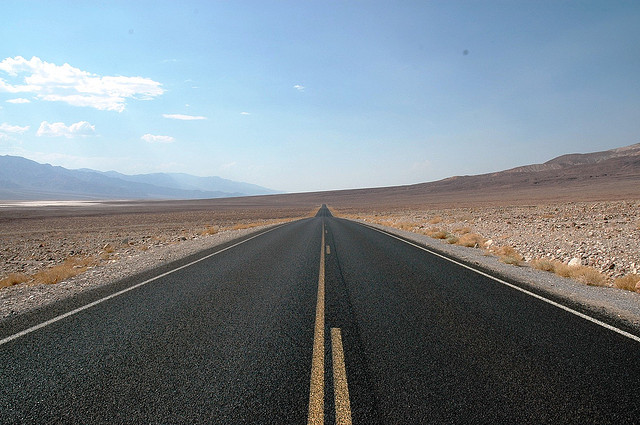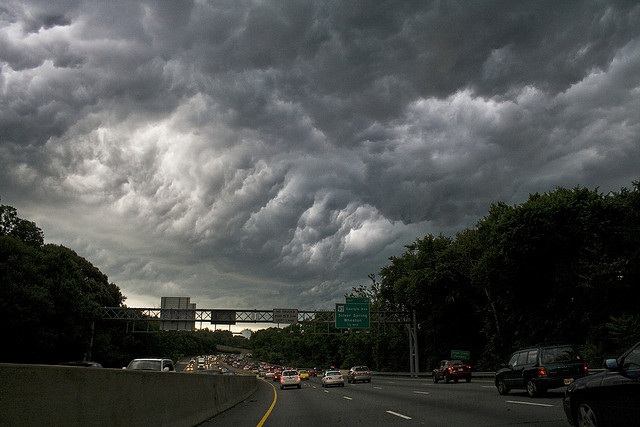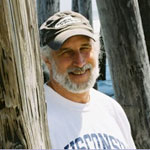TW Column by Steven Lewis
Driving into the Maw of America—at Last

October 1968: A dog-eared copy of On the Road in my back pocket, I imagine myself splitting from Madison, Wisconsin, heading to Chicago, Nashville, Memphis, Oxford, Tupelo, New Orleans, Austin, Amarillo, Taos, the Grand Canyon, Joshua Tree, Big Sur, San Francisco. I’d dance naked in Golden Gate Park, drink with Ferlinghetti and Snyder at City Lights, sleep under the redwoods with the most gorgeous girl I’ve ever seen…if I weren’t married to that gorgeous girl back in Madison, and we didn’t have a baby on the way, and the VW weren’t firmly parked in front of our flat on Dow Court.
June 2013: Never saw so many shredded truck tires in my life. From New Orleans to San Marcos, Texas, hundreds of exploded treads had littered the swampy shoulders and grassy medians along the I-10 corridor. Now, it only got nastier on I-35 around Waco; minefields of burst rubber kept me white-knuckled and swerving as I headed north to Dallas.
My long-delayed solo road trip had begun. In New Orleans, I’d picked up my son Dan's car (a complicated, happily uninteresting back story) before going to San Marcos to see my daughter Elizabeth, a slam poetry queen. Then the grand idea was to return east by way of Memphis—see Graceland and Beale Street—then Faulkner's home in Oxford, Mississippi—then the King’s birthplace in Tupelo—then the Natchez Trace Parkway up to Nashville and the Ryman Auditorium—and, finally, over the Great Smoky Mountains to Cherokee, North Carolina, after which I’d travel the full 469-mile length of the Blue Ridge Parkway back to my home in New York’s Shawangunk Mountains, belting out “Freedom” with Richie Havens all the way.
But after leaving my daughter and heading north, when heavy raindrops splattered the windshield past Dallas, followed by the first of several blaring tornado warnings near the Oklahoma state line, it seemed like something ominous was in the air. As I hurtled forward and backward through time and space, a sultry Lucinda Williams singing me around the bend, my mood grew increasingly dark.
At first, I was depressed by the tawdry images that swished by the Toyota Matrix in the hard-driving rain—the fast-food joints; hotel chains designed by Lego architects; sad budget motels with rusted doors and wheezing air conditioners; windowless, flat-roofed XXX shops; ugly mega malls; uglier strip malls; the coarse, abusive marriage of politics and religion on the crackling radio; peeling billboards preaching every lie of civilization except the road to civilization itself—the ugly detritus of our unapologetically in-your-face culture. Where the hell was America the Beautiful?
Then I was depressed by being 67 and the usual litany of regrets that come along with realizing most of life is behind you. By the time I crossed the Texas-Arkansas line, I was in the throes of a kind of despair I hadn’t known since I was a confused, sullen undergraduate in Madison, Wisconsin.
Frankly, I was as surprised by my despair as I was overcome by it. Like anyone who’s made it to 67, I’ve been hurt down to the bone. I’ve known failure in the marrow. Disappointment beyond disappointment has been etched into my cells. Friends gone. Friends lost.
But I’d never fallen so quickly, so deeply, into such a dismal abyss. I felt listless, a buzzing uneasiness in the sagging muscles of my face, in the exhausting weight of my limbs, in a blurry lightheadedness, the drone of the four-cylinder motor moving me deeper into the darkness. All I could do that rainy evening was pull into a down-at-the-heels Super 8 off I-30, kill the motor, check into a Febrezed room, turn on the TV, and wait for sleep.
I woke the next morning twisted in bed sheets, a rancid metallic taste in my mouth. In the motel lobby, I found some bitter coffee and a stale roll, then drove off toward Little Rock wondering Why now? Why me? This was supposed to be fun.
I take some pride in knowing life for what it is—and what it isn’t. I don’t think anyone is entitled to anything, no matter how good they are or how successful they've been or how hard they’ve worked or how hard they’ve prayed or how much they’ve suffered or endured bad luck—and decade after decade, for more than forty years, I have worked hard, shoulder-to-wheel hard, to deny myself any comfort in the illusion of expectations. And, of course, rainstorms, garish chain stores, ugly strip malls, and shameless politicians are not new to me; nor are mean-spirited radio preachers. Home in bed or in a moldy Super 8, I am not shocked by anything. I am—and have been—a realist all the way down to my proud, agnostic bones.
Or that is who I thought I was before I crossed into the abyss. Still in the world, though maybe a little bit distanced from it all. What some of my students have incorrectly defined as laid back or what a publisher once called a Zen Dad.
And yet mile after tawdry mile east through Arkansas, I found myself drifting deeper into a foggy, rain-splattered morass involving the meaninglessness of life, my pointless existence, the futility of escaping storms we all know are coming, day after day, life after life. I was barreling straight into the maelstrom at 75 miles an hour, windshield wipers swishing back and forth, the blurred road ahead, imagining myself waking each morning for the rest of my days without purpose or belief or meaning.

At some point, I’m not sure where, I turned off the assault on the radio, buried the phone in my bag, abandoned the iPod, and entered a muted silence as I drove on, deeper and deeper into the maelstrom. Where else was there to go?
There was nowhere else to go.
I drove on. I drove on.
And soon enough, I found myself craving—and I’m talking craving, a dizzying hunger beyond hunger—a Big Mac. For reasons beyond understanding, I was ravenous and angry. Angry at the rain. Angry at the crude landscape on either side of the interstate. Angry at some yahoo in a semi going too fast. Angry at an old woman going too slow.
I exited the highway, found some arches right away (of course), and minutes later walked past a cardboard Ronald McDonald, then the glares of some Arkansas locals, and for an instant, my fury almost eclipsed my hunger.
So, when I got back into the car, full to the point of nausea but still starving for that ineffable something—anything, maybe just noise—I punched the radio back on and drove away to the cottony voice of another smug preacher full of certitude about God’s reckoning, including my damnation, and (of course) the Lord’s message to support his ministry. Jaw clenched in my own inchoate fury, tailgating, grousing at tailgaters, weaving in and around rush-hour traffic, I heard the hissing viciousness of the preacher’s voice crackling through the speakers. And just as I wondered how the Prince of Peace spawned such hateful rhetoric, sixty miles west of Memphis, I heard my own self-righteous voice damning him and everyone like him to hell.
Everyone. Every goddamned one.
But it wasn’t until I pulled out in front of a shiny BMW, and the pretty young woman behind the wheel made a really ugly face and gave me the finger, that I saw, finally, the line on the map of my own desperation and despair and fury.
Whether she was texting or daydreaming or changing songs on her iPod—I don’t know, it doesn’t matter—she wasn’t paying attention, and as I merged into the traffic, I’d obviously startled her. Spooked her. Terrified her. Behind the damning finger and the ugly mask, I saw the face of a little girl, scared to death I was going to kill her.
And in that unmiraculous instant, I saw how rage all begins in mortal fear—snarling animals outside the cave, monsters under the bed, the bogeyman in the cellar—and from there, how it’s a straight shot across eons to human vanity and vexation, righteousness and vindication, bitterness and fury. I saw on that stretch of I-40 how all the crudenesses of contemporary life were little more than institutionalized rest stops for the anxiety we all know in our bones. It’s the anxiety I share with every other human being trying to live life in a dangerous and inescapably mortal world.
Heading into Memphis, I thought of the Misfit in Flannery O’Connor’s “A Good Man Is Hard to Find”: No pleasure but meanness. And for the first time, I got it. I got it!
And for all the good it did me, I understood then that it just doesn’t matter whether we find sanctuary in alcohol, sports, pornography, gaudy jewelry, good grades, guns, marathons, parenthood, Pulitzer Prizes, Oscars, mega malls, clean houses, mansions, politics, movie theaters, happy faces, cocaine, obesity, anorexia, lottery tickets, Adonai, Jesus, Yahweh, Allah, Abba, Elohim, psychotherapy, veganism, a Zen countenance, or even anxiety itself—each is just another self-medicating escape from the bone-deep dread of life. Each one a drug. A Big Mac.
And like all drugs that promise relief from the fate of being human, each one soon enough turns us into the same mean drunk.
So, with that revelation—if you can call it that—and the unsettling understanding that there’s little or nothing to do to make it untrue short of driving off a cliff, I drove on.
I drove on. And as I exited the highway into Memphis, my depression seemed to lift like the fog. A miracle, of sorts.
I was just driving now, lighter of spirit, first toward Elvis’s pathetic and graceless Graceland (which I enjoyed, despite myself), then over to gritty and wonderful Beale Street and the ironically uplifting blues wafting out of every bar and alleyway.
By the next evening, even while staying in a fleabag motel in Oxford, Mississippi, I felt a true renewal of spirit, wandering around the next morning at Faulkner’s gracious home at Rowan Oaks. And that afternoon, by the time I found the Natchez Trace—a heavenly, ghostly stretch of uncommercialized parkway—I realized with odd relief that if I could live with the singular truth of my own unremarkable destiny, without rancor, without hope, I wouldn’t be starving anymore. I wouldn’t be lost. I wouldn’t be tailgating. I wouldn’t be consumed by rage. I wouldn’t be in hell.
Give me a Hallelujah.
Like what you're reading? Click Donate to Talking Writing.
Support a great nonprofit magazine—and vote for a theme next year!
Art Information
- "...Middle..." © Flavia; Creative Commons license.
- "Ominous Commute" © Woodleywonderworks; Creative Commons license.
 Steven Lewis is a columnist at Talking Writing, a contributing writer at Spirituality & Health, and Literary Ombudsman for WritersReadOnline. A current member of the Sarah Lawrence College Writing Institute faculty, he's a longtime freelancer, and his work has been published widely, from the notable to the beyond obscure.
Steven Lewis is a columnist at Talking Writing, a contributing writer at Spirituality & Health, and Literary Ombudsman for WritersReadOnline. A current member of the Sarah Lawrence College Writing Institute faculty, he's a longtime freelancer, and his work has been published widely, from the notable to the beyond obscure.
The title for this piece comes from Lawrence Ferlinghetti’s “I Am Waiting,” where the poet cries, “I am waiting for the Second Coming” and “a new rebirth of wonder.” Steve adds:
After years of writing self-indulgent poetry in Madison, Wisconsin—mostly to meet girls—the poet James Hazard offered me a flashlight to navigate the self-reflective shadows so that I might glimpse the illuminating voice.
For more information, see his website Steven Lewis, Writer.
